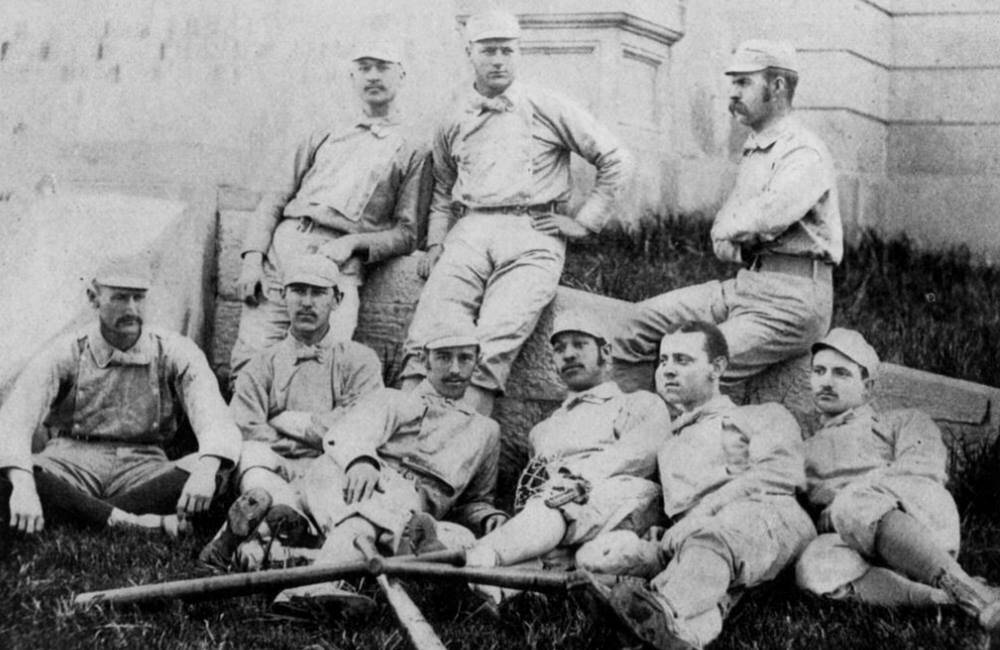Moses Fleetwood Walker was the first black man to play in professional baseball in the United States, playing catcher for Toledo in the American Association for 42 games in 1884. Later in life, he became an inventor, entrepreneur and book author.
Walker, who attended college at the University of Michigan, has often been eclipsed by what Jackie Robinson did about 60 years later. But Walker now is recognized for being the first player to break through professional baseball’s so-called “color barrier.”
Moses Fleetwood Walker’s Early Life
Walker was born in Mount Pleasant, Ohio, on Oct. 7, 1856. His father was a physician, according to Black Past. In 1878, Walker enrolled in Oberlin College. He played for five years on the college’s newly formed baseball club.
The University of Michigan recruited him to play on their team, starting in 1881, He also earned money by playing with professional teams in the area. One of those was the Toledo Blue Stockings of the Northwestern League.
It was while playing with Toledo that Walker made history.
Racism in Kentucky
Toledo was still a minor league team in 1883 when Walker joined the club as a catcher. He was best known for his defensive skills and, according to press reports at the time, helped improve Toledo’s pitching staff.
However, the first overt sign of trouble involving race came in an August 1883 exhibition game against the Chicago White Stockings. The Chicago manager, future Hall of Famer Cap Anson, refused to let his team play against Toledo if Walker was in the lineup.
According to biographer David W. Zang, Walker also was refused a room at a Louisville, Ken., hotel during a road trip there. During the game against the Louisville Eclipse, several of the Louisville players said they would not play if Walker was in the lineup for Toledo.
These racist demands – which met with success – were the first steps in establishing a racial barrier in baseball.
However, it did not become official, A representative from the Northwestern League’s Peoria, Ill., team attempted to get a new rule passed in 1883 that banned black players from the league. The measure was dropped.
The 1884 Season
Walker was initially recruited to Toledo by William Voltz, a former sportswriter who had seen Walker play during his days at Oberlin. While not a good hitter, Walker was considered an excellent catcher and helped to solidify the Toledo defense.
Walker officially became the first black player in baseball on May 1, 1884, in a game against Louisville. Both teams now played in the American Association at the top level of baseball. The hotel where Walker stayed, The St. Cloud Hotel, refused to serve him breakfast. Also, many papers across the South had “engaged in a constant—sometimes savage—campaign to denigrate Walker,” according to Zang.
However, Walker played the game. There were no racial incidents, according to newspaper accounts. However, Walker – ironically, considering defense was his strength – committed three errors during the game. Given the situation, however, perhaps that’s not so surprising.
Racism, Injuries Haunt Walker’s Career
Moses Fleetwood Walker played in 42 games in 1884 for Toledo – in an interesting coincidence, that’s Jackie Robinson’s famous uniform number. His brother, Weldy, also joined the team for five games.
But the racism, especially in the South, was overt and at times terrifying. For example, before a game in Richmond, Virginia, the Toledo manager received an unsigned letter saying 75 men would “mob” Walker if he appeared at the stadium dressed to play. Walker was released about three weeks before the Richmond game.
Walker had been plagued by injuries throughout the season. He only played six times after July 12 due to injuries and was finally released for good on Sept. 22, 1884. No black player would play at the major league level again until Robinson.
Life After Baseball
As noted by MLB.com., Walker might have stayed in the big leagues longer if he had more talent. Unlike Robinson years later, Walker was seen more like a solid player, not a superstar. Still, there’s little doubt his race played a factor.
The position took by Anson during the exhibition game became the standard for white owners, managers and players – they weren’t going to play against a team with a black player. This effectively shut the door on black players in baseball.
Walker played for minor league clubs after 1884, but eventually left baseball for good in 1889. He went on to become an inventor, a postal service worker, and an entrepreneur who ran a hotel in Steubenville, Ohio, and movie theater in Cleveland.
He wrote a book, “Our Home Colony,” about his experiences with racism and advocated that black people return to Africa rather than live with racial intolerance in the U.S.
In 1891, he stabbed and killed a white man during a fight outside of a saloon in which racial slurs were hurled at him. An all-white jury found Walker innocent.
Walker died of pneumonia on May 11, 1924 and was buried in Steubenville.


Leave A Comment